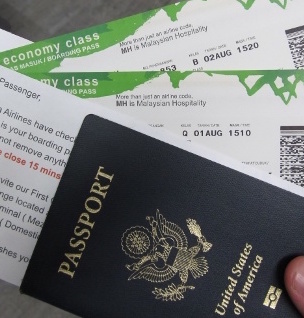Location-Independence: Musings from My 3rd Year on the Road
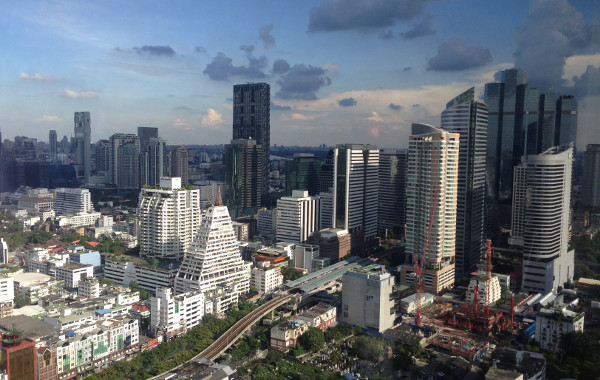
What if home was everywhere?
After more than two years on the road it finally sunk in: location-independence is not an aberration. Moving around the world at will is a perfectly valid and (extremely) advantageous lifestyle choice, but ultimately just another way to navigate through life.
It has, however, warped my notion of reality over the last 6 months.
On the outset it would have been impossible to predict exactly how, but the mindset shift is more profound than internalizing maxims like “travel more slowly to avoid burnout.”
The way I see the world–opportunities, limitations, and what passes for ‘normal’–is fundamentally changing. Here are some of these observations from my 3rd year of life on the road:
[Photo Above: Bangkok]Location-agnosticism and the eradication of geographic space
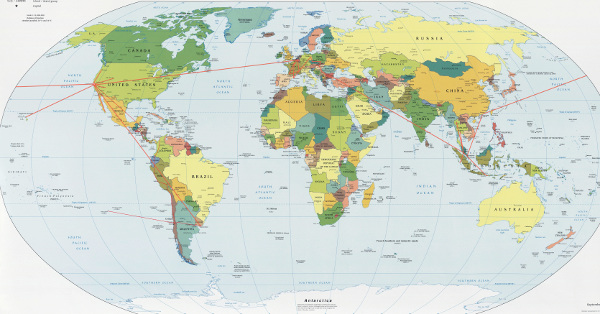
One recent weekend in rural Indonesia I caught myself working out the logistics of getting to the CrossFit gym in Bangkok, on the following Monday. As if somehow the ~3,000+ kilometers separating the two was non-existentent.
Sure, I would spend some time at the airport, but on strict economic terms the location didn’t matter: the cost-of-living difference between Indonesia and Thailand is negligible and the plane ticket cost less than $200. But a year ago I would have thought this was insane.
The affordability of modern air travel* means the other side of the world just isn’t that far away anymore, and my mental map is now a warped version of global geography that looks like something the early Dutch explorers would have pencilled out. Rapid movement and comfort with it means changes in location are less dramatic. Add to this some constancy to your daily schedule and it’s easy to wake up and forget where you are.
The beauty of routine is that you can pack it and take it with you. I can complete a day’s work anywhere on earth now: I wake up, eat breakfast, work, go to the gym, eat, sleep, and so on, and it doesn’t make much difference if I’m in rural Indonesia, Barcelona, or Santa Cruz. (I did in fact write most this on a remote island off the coast of Sumatra).
Location-agnosticism as a practice has major benefits, and a few drawbacks. On the one hand, global continuity allows me to ‘get things done’ and move forward on all fronts, regardless of (but accelerated by) location. If you can be anywhere, it makes sense to find the best place on earth to suit your needs, and these days I’m less focused on the question “where can I go next?” and instead: “what is my next goal?” and “where on earth can I accomplish it best?”.
The downside? Diving too deep into routine can cheapen the experience of being in a particular place. It also reduces the type of random events that make travel fun and educational, and in some ways has lead to a sort of death of travel (at least Lonely Planet style), in that I tend to move quickly to a new location and stay put for months at a time.
Easy problems to fix (more on routines for dynamic environments later), and either way there is far more opportunity here than downside.
(*CO2 emissions notwithstanding. I’ve been a proponent of taxing emissions for a decade.)
The World: Overflowing with Fixable Problems
Like many before me, I grew up with a limited view of lifestyle options. My childhood gave me two:
- be a dirtbag (ski bum, river guide, seasonal worker, etc) OR
- get a real job (as in The Office).
The first entails a large degree of freedom, but it comes at the cost of earning potential (if that matters) and social status (which is easier to say you don’t care about than to actually not care about), and it’s not necessarily work you want to do forever. The second option was always considered worse by any measure.
I knew of few non-professional athletes/non-trust fund babies who were able to do both (e.g. earn money and do what they wanted). The eminently successful but reluctant businessman Yvon Chouinard (founder/owner Patagonia) said ‘sure, I’ll start a business. But only if I can take 6 months off per year to climb.‘ Champion.
The surprising thing is how long my narrow view of optionality followed me through life. Even in my last job in San Francisco in 2011 I could only imagine a few outcomes:
- Sell a company and make millions, then do whatever I wanted,
- Quit, spend all money traveling, then come back and get another job, OR
- Figure out a 4-Hour Workweek “business” that would pay the bills until it blew up and repeat #2 again.
More than two years after going with the second option, I can’t believe I was that simple-minded.
Big surprise, but the world is not perfect, and this means there is opportunity everywhere: massive inefficiency, products that don’t work, services that could be drastically improved or niched down, friends who need help with their business, small-business owners who are overwhelmed and drowning. Inefficiency and opportunity in human systems are the norm, not the exception. The longer I’m on the road the more business opportunities I see, and I have to constantly remind myself that one at a time is enough.
Throw the tools and tricks of location-independence into the mix, e.g. the simple fact that you can live for $500 a month in Thailand (like a boss) while you test out a new idea, and it’s hard to fail.
A number of readers have asked me how to get started working online (or generally what the hell I’m talking about here), and here’s a (flippant) answer:
The Spartan Guide to ‘Business’:
- Find someone who has a problem.
- Figure out how to fix the problem (or part of it).
- Offer this person a solution to the problem for a reasonable amount of money.
- If they pay you, repeat #3 over and over again. If they don’t, go back to #2, and if this fails, #1.
The advantage to doing this online (vs in person) is obvious. What you develop by running through the process above is an entrepreneurial skill set: building and refining tools to rapidly and systematically test out ideas. Don’t let the word entrepreneur scare you either, and note that most people who use it as a self-descriptive term are full of shit. Entrepreneurs are tinkerers who solve problems. That’s it. They are hustlers and doers, despite education-level, social status, or location.
If you can work through the problem-solving process without running out of spending money (runway), and without accruing debt (your money or someone else’s), you can’t lose.
Building the entrepreneurial skill set is the most anti-fragile thing you can do–it’s the back-to-nature survival skill-set for the 21st Century. The options are compounded by the advantages of location independence: a) cost differences in living expenses that give me a longer runway to test ideas (baselining), b) building problem-solving teams in areas with affordable top-level talent (geo-arbitrage), c) general access to a global hiring/working pool d) the anti-fragility of leading a simple, mobile existence, etc.
More and more tech-savvy kids are opting for a Stoic lifestyle that involves a few hours of hacking every day to pay the bills. This is new in history: no longer do you have to rely on seasonal work or a trust fund to be a dirtbag traveler, rock-climber, surfer, whatever. There are as many options as there are ideas. Welcome to the rise of internet-dirtbaggery and the one-(wo)man micro-multinational corporation.
Routines and ‘building the system’ have a centering effect
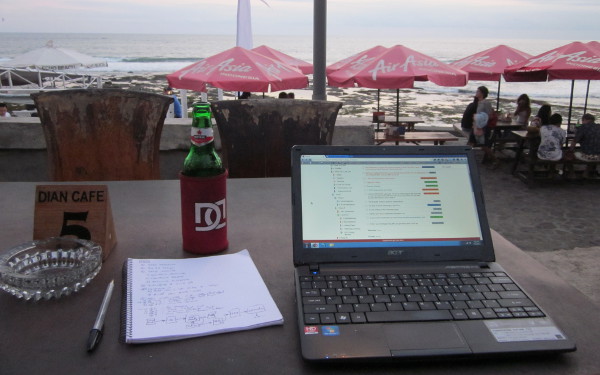
My routines and work have also anchored me in ways I didn’t anticipate. No matter where I am on earth I can plug in and continue to build ‘the system.’ The system covers a lot of bases, including income generation, the need to be productive, and provides a lab for experimentation with the elements of lifestyle-design, entrepreneurship, and personal development.
Plugging into a location-agnostic creation helps solve the existential ‘what the hell am I doing with my life’ angst that I used to have in my early travel days. I know exactly what I’m doing, and it’s not the much different from what I was doing in San Francisco. I just now own 100% of my time, assets, and location, and get to focus the laser beam wherever I want.
As I mentioned, the major downside is the difficulty of unplugging – it takes a lot of discipline to get out of the Matrix to actually enjoy where you are. But this is a 21st century problem that happens everywhere.
Global Citizenship and the USA as just another expensive country
A corollary to my shrinking mental map: the USA now exists on some list of expensive countries with a lot of rules. It’s probably in there with Germany and maybe some Scandinavian countries.
Don’t get me wrong, I’m a big fan of many parts of the US (as well as Germany and Scandinavian countries), but my association with the current state of things has diminished as well as my need/desire to have anything to do with it. I rarely hear news about the US unless I check Facebook (I’m more concerned with typhoons), but at this point outside of new tax laws for expats or nation-building [destabilizing] campaigns it doesn’t really affect me.
Global citizenship has a nice ring to it, and I’d really like to live in a country where I can drink a beer on the beach without going to jail. Throw things like the possibility of not having to pay taxes into the mix, and returning to America for any major length of time gets less and less likely.
I used to periodically return home to ‘get what I want when I want it.’ The right cup of coffee, a hot shower that works every time, the familiar smells of home at certain times of year, seeing family and friends. But this begs the question: if I can now build routine, community (see below) and usually ‘get what I want when I want it’ anywhere on earth, what is ‘home’ exactly?
My stuff is inter-changeable and replaceable
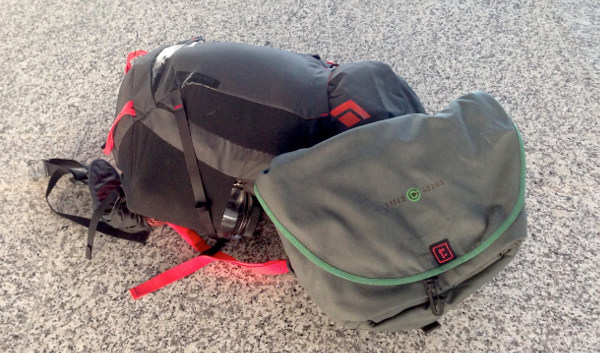
Speaking of the Stoics: I’ve lost or had more things stolen in the last three months than in over two years. Unless it’s part of my work kit I tend to shrug and happily re-weigh my pack (it gets lighter).
I used to be strongly attached to individual pieces of equipment, which probably had a lot to do with being financially poor (but experience rich) for most of my life. When I bought something it was a big deal, and I didn’t want to do it again for a long time. Since I rarely convert cash into material goods these days I have a relatively small amount invested in them.
Note: I’m not trying to be elitist or an ultra-light fanatic. It’s more about the physical and psychological hassle of lugging a bunch of unneeded goods around the world. It’s also a much better strategy to keep assets in cash than vs ‘fragile’ material goods.
The upshot is that 1) I don’t have much to replace if it goes away, and 2) not buying things means I always have enough surplus cash to do so if I really need something.
The non-fixed Value of Cash
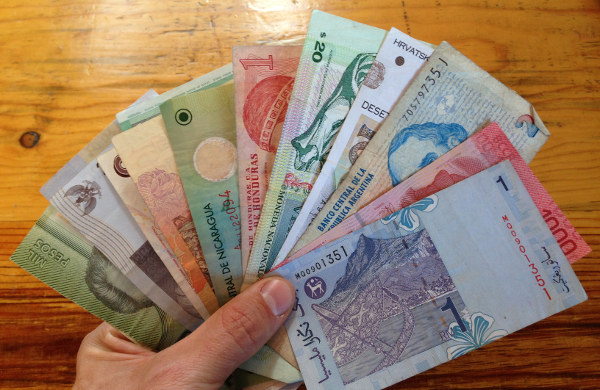
Money always had a fixed value for me. $200 was $200. But now $200 has a relative worth depending on many factors, including how much I’ve spent this month (the value diminishes the less I’ve spent), how pressed I am for time (value decreases when time is scarce), or how far $200 can get me (geographically).
Some of this change has to do with leaving the $0-income category. But it also has a lot to do with internalizing that Wealth = Time + Mobility + Cash.
I’m much more concerned these days with ways to maximize what I’m doing, rather than the exact cost of doing them. In my extremely frugal past I would never take a taxi, but these days I’m finding myself willing to pay $20 if it saves me an hour of time and attention.
To clarify: I’m not a fan of wasting money, but I’ll happily trade some of it if the equation above works out. The value of a dollar/baht/rupiah is much more relative than ever before.
The location-independent Fraternity
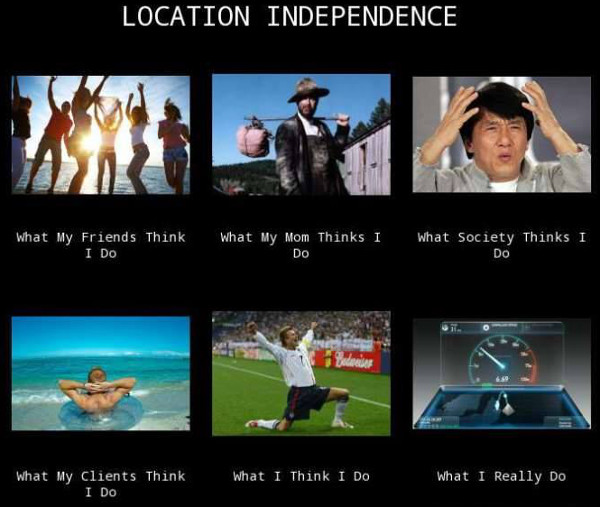
Quitting my last job was one of the most difficult things I’ve ever done. By all standard measures it was a good job: paid well, relatively secure, seniority, looked good on the resume. I also quit in the midst of the global recession. I remember struggling with opting out of the standard track: the classic existential floggings of ‘maybe I just can’t hack it’, ‘maybe I’m just fooling myself’, ‘the 4-Hour Workweek has ruined my life’, etc.
I remember spending a lot of time and mental energy thinking I had to justify my decision to my old peer group. Turns out they didn’t really care what I did (that was all in my head). Had I known the the location-independent community was already huge, growing, and here to stay, I wouldn’t have worried.
Basically, once I got out the door and on the road I found my people.
Last month I joined a group of 210 location-independent entrepreneurs in Bangkok for the annual TropicalMBA conference. It was a sold out event, and represents only a fraction of those involved in the community. I’m now in Chiang Mai–digital-nomad capital of the world–where within 10 minutes of landing you can immediately plug into a community of hundreds–if not thousands–of people who are into the same things.
It’s a diverse group, ranging from seasoned entrepreneurs to precocious teenagers, but united by the desire to take advantage of global opportunities. More and more travelers I talk to, after they hear my spiel about ‘working on my laptop’, respond with an ‘oh yeah my friend does that.’ Enrollment is open to anyone who can use a computer and is willing to learn.
Although not being tied to location is a central tenet of the community, regional hubs have been focusing a lot of talent: places like Chiang Mai, Berlin, and Saigon, that offer the right balance of cost-of-living, lifestyle quality, and community of like-minded individuals. In the future, countries that lift visa restrictions and offer incentives like capital investment and reduced taxes are going to see an influx of entrepreneurial talent they can’t imagine.
Where to next?
The real question is: what combination of locations in 2014 will give me the best opportunities?
Things feel like they’re speeding up. Who knows what the next year will bring, but I have the distinct feeling this is only the beginning, not only of my own journey but of the opportunities available to everyone.
In any case, more musings to come. Thanks for reading!


